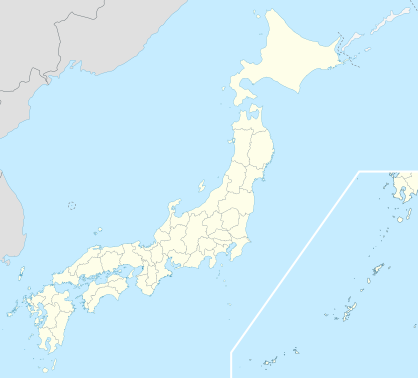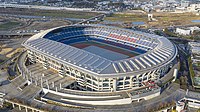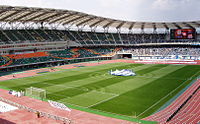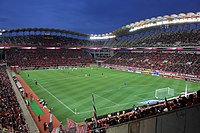2002 FIFA World Cup
| 2002 FIFA 월드컵 한국/일본 (Korean) 2002 FIFA Woldeu Keop Hanguk/Ilbon 2002 FIFAワールドカップ 韓国/日本 (Japanese) 2002 FIFA Waarudo Kappu Kankoku/Nippon | |
|---|---|
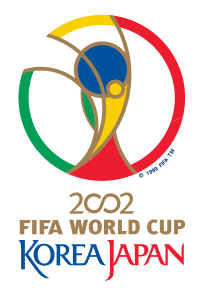 | |
| Tournament details | |
| Host countries | South Korea Japan |
| Dates | 31 May – 30 June |
| Teams | 32 (from 5 confederations) |
| Venue(s) | 20 (in 20 host cities) |
| Final positions | |
| Champions | |
| Runners-up | |
| Third place | |
| Fourth place | |
| Tournament statistics | |
| Matches played | 64 |
| Goals scored | 161 (2.52 per match) |
| Attendance | 2,705,198 (42,269 per match) |
| Top scorer(s) | |
| Best player(s) | |
| Best young player | |
| Best goalkeeper | |
| Fair play award | |
The 2002 FIFA World Cup, also branded as Korea Japan 2002, was the 17th FIFA World Cup, the quadrennial football world championship for men's national teams organized by FIFA. It was held from 31 May to 30 June 2002 at sites in South Korea and Japan, with its final match hosted by Japan at International Stadium in Yokohama. During the opening ceremony, the championship was declared opened by President of South Korea Kim Dae-jung.[1]
A field of 32 teams qualified for this World Cup, which was the first to be held in Asia, the first to be held outside of the Americas or Europe, as well as the first to be jointly hosted by more than one nation. China, Ecuador, Senegal and Slovenia made their World Cup debuts, with Senegal being the only debutant to qualify the group stages and make it to the quarterfinals.
The tournament had several upsets and surprise results, which included the defending champions France being eliminated in the group stage after earning a single point without scoring a goal and second favourites Argentina also being eliminated in the group stage. South Korea managed to reach the semi-finals, beating Poland, Portugal, Italy and Spain en route. They became the first team from outside of the UEFA, CONMEBOL, and CONCACAF regions and one of the first Asian teams (along with Turkey in this World Cup) to reach the semi-finals of a World Cup. However, the most potent team at the tournament, Brazil, prevailed, winning the final against Germany 2–0, making them the first and only country to have won the World Cup five times.[2] The victory qualified Brazil for the 2003 and subsequently 2005 FIFA Confederations Cups, its fourth and fifth Confederations Cup appearance in a row. In the third place play-off match against South Korea, Turkey won 3–2, taking third place in only their second ever FIFA World Cup, and scored the fastest goal in the FIFA World Cup history (10.8 seconds after kick-off).[3]
The 2002 World Cup was also the last one to use the golden goal rule and the last one to use the same ball for all matches. Starting in 2006 and continuing to the present, a ball with the same technical specifications but different colors has been used in the final.
Host selection[edit]


South Korea and Japan were selected as hosts by FIFA on 31 May 1996. Initially, South Korea, Japan and Mexico presented three rival bids. South Korea's entry into the race was seen by some as a response to the bid of political and sporting rival Japan.[4] FIFA leaders were split on whom to favor as host as politics within the world governing body held sway.[5] With Mexico regarded as a long shot, the battle to host the tournament came down to South Korea and Japan. The two Asian rivals went on a massive and expensive PR blitz around the world, prompting Sultan Ahmad Shah, the head of the Asian Football Confederation, to step in.[4] FIFA boss João Havelange had long backed the Japanese bid,[5] but his rival in FIFA, UEFA chief Lennart Johansson, sought to undermine Havelange's plans.[5] UEFA and the AFC viewed co-hosting between the two Asian rivals as the best option.[5] South Korea and Japan were finally faced with a choice of having no World Cup or a shared World Cup and they reluctantly chose to go along with co-hosting.[5] South Korea and Japan were chosen unanimously as co-hosts in preference to Mexico.[6] This was the first World Cup to be hosted by more than one country, the second being the 2026 World Cup, which will be hosted by the United States, Mexico and Canada. This is also the first ever World Cup to be hosted in Asia, the other being the 2022 World Cup, hosted by Qatar, twenty years later. The general secretary of South Korea's bidding committee, Song Young-shik, stated that FIFA was interested in staging some matches in North Korea in order to aid Korean reunification, but it was ruled out.[7]
At the time the decision was made, Japan had never qualified for a World Cup finals (although the Japanese did subsequently qualify for the 1998 competition). The only other countries to have been awarded a World Cup without previously having competed in a final tournament are Italy in 1934 and Qatar in 2022 (Uruguay hosted the first World Cup in 1930 so there was no prior tournament; they were defending Olympic champions from 1928).
The unusual choice of host proved an issue for football fans in Europe, used to watching international matches on or close to their time zone.[8] With games taking place in the European morning, some schools and businesses chose to open late on match days or set up communal watching events before the start of work.[9][10]
Qualification[edit]
199 teams attempted to qualify for the 2002 World Cup. The qualification process began with the preliminary draw held in Tokyo on 7 December 1999. Defending champions France and co-hosts South Korea and Japan qualified automatically and did not have to play any qualification matches. This was the final World Cup in which the defending champions qualified automatically.[11]
14 places were contested by UEFA teams (Europe), five by CAF teams (Africa), four by CONMEBOL teams (South America), four by AFC teams (Asia) and three by CONCACAF teams (North and Central America and the Caribbean). The remaining two places were decided by playoffs between AFC and UEFA and between CONMEBOL and OFC (Oceania). Four nations qualified for the finals for the first time: China, Ecuador, Senegal and Slovenia. As of 2022, this was the last occasion on which the Republic of Ireland and Turkey qualified for a FIFA World Cup finals, and the only time that China have qualified, as well as the last time that Australia and Switzerland failed to qualify.
Turkey qualified for the first time since 1954, Poland and Portugal both qualified for the first time since 1986 and Costa Rica and Uruguay qualified for the first time since 1990. Sweden, Russia and the Republic of Ireland also returned after missing the 1998 World Cup. 1998 semi-finalists the Netherlands, three-time participants in the 1990s Romania and Colombia, and Bulgaria, Morocco and Norway, who had participated in the previous two finals tournaments, alongside Austria, Chile, Iran, Jamaica, Scotland and Yugoslavia which participated in the latest edition, failed to qualify. South Korea set a record by appearing in a fifth successive finals tournament, the first nation from outside Europe or the Americas to achieve this feat.
All seven previous World Cup-winning nations (Argentina, Brazil, England, France, Germany, Italy, and Uruguay) qualified, which broke the record of most previous champions at a tournament before the record was broken again in 2014. The highest ranked team not to qualify for the finals was Colombia (ranked 4th), while the lowest ranked team that did qualify was China PR (ranked 50th).
List of qualified teams[edit]
The following 32 teams, shown with final pre-tournament rankings,[12] qualified for the final tournament:
|
|
|  Countries qualified for the World Cup Country did not qualify Countries that did not enter the World Cup Country not a FIFA member
|
Venues[edit]
South Korea and Japan each provided 10 venues, the vast majority of them newly built for the tournament. Groups A–D played all their matches in South Korea and Groups E–H played all their matches in Japan.[13] The stadiums in Daegu, Suwon, Yokohama and Saitama all hosted 4 matches each, while the other 16 stadiums hosted 3 matches each. Notably, no matches were played in Tokyo, making it the second capital of a host country not to have a World Cup venue after Bonn of West Germany in 1974. [a] Also, none of the venues (even the 48,000 capacity National Stadium in Tokyo and the 69,950 capacity Seoul Olympic Stadium in Seoul) those hosted the 1964 and 1988 Summer Olympics were not used in the tournament.
- A cross denotes an indoor stadium.
Match officials[edit]
There was much controversy over the refereeing in the tournament.[34] Questionable decisions in the match between Italy and South Korea resulted in 400,000 complaints, and featured in ESPN's 10 most fabled World Cup controversies.[35] The match between Spain and South Korea featured two controversially disallowed Spanish goals, which Iván Helguera referred to as "a robbery" and led to Spanish press brandishing the officials "thieves of dreams", though FIFA dismissed the incident as human error.[36][37]
Squads[edit]
This was the first World Cup that featured squads of 23 players, an increase from 22 previously. Of the 23 players, three must be goalkeepers.
Draw[edit]
The FIFA Organising Committee announced the eight seeded teams on 28 November 2001. The historic tradition to seed the hosts (Japan and South Korea) and holders (France) was upheld; while the remaining five seeds were granted to the other five of the top six teams, ranked by their results in the last three FIFA World Cups (ratio 3:2:1) and their FIFA World Ranking position in the last month of the past three years (equal ratio).[38]
For the draw, the 32 teams were allocated into four pots; the eight top-seeded teams, were allocated in pot 1 and would be drawn/selected into the first position of the eight groups playing in the group stage. The remaining 24 unseeded teams, were allocated into three pots based on geographical sections, with the: 11 European teams in pot 2; two Asian teams and three South American teams in pot 3; three North American teams and five African teams in pot 4.[39]
The general principle was to draw one team from each pot into the eight groups, although with special combined procedures for pot 2 and pot 3, due to comprising more/less than eight teams - but sixteen teams in total. At the same time, the draw also needed to respect the geographical limitation, that each group could not feature more than one team from each confederation, except for the European teams where the limitation was maximum two per group. Finally, special limitations were also stipulated to evenly distribute the presence of teams from each confederation between the groups playing respectively in Korea (group A-D) and Japan (group E-H); while China for political considerations only could be drawn for one of the groups playing in Korea.[39]
| Pot 1 Top-seeded teams (DC + hosts + top 5 seeds) | Pot 2 Europe (UEFA) | Pot 3 Asia & South America (AFC & CONMEBOL) | Pot 4 Africa & North America (CAF & CONCACAF) |
|---|---|---|---|
- The draw took place at Busan Exhibition and Convention Center in South Korea, and was televised live on 1 December 2001: World Cup Draw 2002 on RTÉ.
The FIFA Organising Committee decided ahead of the draw, to place the defending champions (France) in Group A; while the co-hosts South Korea and Japan were placed respectively in Group D and Group H. The procedure for the draw comprised the following six steps:[39][40]
- Pot 1 was used to draw, in alphabetic group order, the remaining five top-seeded teams for the first position of groups B, C, E, F and G; while respecting the restriction that one of the two South American seeds (Brazil and Argentina) had to play in a group played in South Korea (B/C) and the other had to play in a group played in Japan (E/F/G).
- Pot 2 was used to draw one European team to each of the eight groups (drawing unrestricted in the alphabetic order from A to H).
- As per the FIFA rule of only allowing a maximum of two European teams in each group, the remaining three European teams from Pot 2, was subject to a second draw, to be put in either of the four groups containing a top-seeded South American team or Asian team. This was done by first drawing the European team from Pot 2, and then drawing which seeded opponent the European team should be paired with, from a special bowl with four blue balls containing the names of Brazil, Argentina, Japan and South Korea.
- Pot 3 was used to draw one team to each of the five groups with an empty third slot (drawing in alphabetical order from A to H); while respecting the geographical restrictions, that:
- None of the unseeded South American teams (Ecuador, Paraguay, Uruguay) from pot 3, could be drawn into a group with a seeded South American team (Brazil and Argentina).
- None of the unseeded Asian teams (Saudi Arabia and China) from pot 3, could be drawn into a group with a seeded Asian team (South Korea and Japan in Group D and H); along with the overall rule that China had to play in South Korea (meaning either group A, B or C) and that Saudi Arabia had to play in Japan (meaning either group E, F or G).
- Pot 4 was used to draw one team to each of the eight groups (drawing in the alphabetic order from A to H); while respecting the restrictions that:
- Minimum one North American team and minimum two African teams should be drawn to a group located in South Korea (Group A/B/C/D)
- Minimum one North American team and minimum two African teams should be drawn to a group located in Japan (Group E/F/G/H)
- To decide the match schedules, the exact group position number for the un-seeded teams in each group (2, 3 or 4), were also drawn immediately from eight special group bowls, after each respective team had been drawn from pot 2, 3 and 4.
Besides of drawing the teams, the event also featured American vocalist Anastacia giving a debut public performance of the official song of the World Cup: Boom.[41][42]
Draw results and group fixtures[edit]
The draw resulted in the following eight groups:[40]
| Pos | Team |
|---|---|
| A1 | |
| A2 | |
| A3 | |
| A4 |
| Pos | Team |
|---|---|
| B1 | |
| B2 | |
| B3 | |
| B4 |
| Pos | Team |
|---|---|
| C1 | |
| C2 | |
| C3 | |
| C4 |
| Pos | Team |
|---|---|
| D1 | |
| D2 | |
| D3 | |
| D4 |
| Pos | Team |
|---|---|
| E1 | |
| E2 | |
| E3 | |
| E4 |
| Pos | Team |
|---|---|
| F1 | |
| F2 | |
| F3 | |
| F4 |
| Pos | Team |
|---|---|
| G1 | |
| G2 | |
| G3 | |
| G4 |
| Pos | Team |
|---|---|
| H1 | |
| H2 | |
| H3 | |
| H4 |
In each group, the teams played three matches, one against each of the other teams. Victories were granted 3 points, while a draw was equal to 1 point. After completion of the Group stage, the best two teams of each group advanced to the Round of 16 in the knockout stage, in a way so all group winners started out meeting a runner-up from one of the other groups. This format was identical with the tournament structure being used in 1998. A total of 64 games were played, including the final and a bronze medal game between the two semifinale losers.
Group F was considered the group of death, as it brought together Argentina, England, Nigeria and Sweden.[41]
The fixtures for the Group stage were decided based on the draw results, as follows:
| Matchday | Dates | Matches |
|---|---|---|
| Matchday 1 | 31 May – 5 June 2002 | 1 v 2, 3 v 4 |
| Matchday 2 | 5–10 June 2002 | 1 v 3, 4 v 2 |
| Matchday 3 | 11–14 June 2002 | 4 v 1, 2 v 3 |
Group stage[edit]
All times are Korea Standard Time and Japan Standard Time (UTC+9)
Groups A, B, C and D based in South Korea. Groups E, F, G and H based in Japan.
In the following tables:
- Pld = total games played
- W = total games won
- D = total games drawn (tied)
- L = total games lost
- GF = total goals scored (goals for)
- GA = total goals conceded (goals against)
- GD = goal difference (GF−GA)
- Pts = total points accumulated
The teams in the group play were ranked upon
- Points
- Greatest total goal difference in the three group matches
- Greatest number of goals scored in the three group matches
- Most points earned in matches against other teams in the tie
- Greatest goal difference in matches against other teams in the tie
- Greatest number of goals scored in matches against other teams in the tie
- Drawing of lots
In the original version of the rules for the final tournament, the ranking criteria were in a different order, with head-to-head results taking precedence over total goal difference. The rules were changed to the above in advance of the tournament, but older versions were still available on the FIFA and UEFA websites, causing some confusion among those trying to identify the correct criteria.[43]
Group A[edit]
| Pos | Team | Pld | W | D | L | GF | GA | GD | Pts | Qualification |
|---|---|---|---|---|---|---|---|---|---|---|
| 1 | 3 | 2 | 1 | 0 | 5 | 2 | +3 | 7 | Advance to knockout stage | |
| 2 | 3 | 1 | 2 | 0 | 5 | 4 | +1 | 5 | ||
| 3 | 3 | 0 | 2 | 1 | 4 | 5 | −1 | 2 | ||
| 4 | 3 | 0 | 1 | 2 | 0 | 3 | −3 | 1 |
| France | 0–1 | |
|---|---|---|
| Report | Bouba Diop |
| Senegal | 3–3 | |
|---|---|---|
| Fadiga Bouba Diop | Report | Morales Forlán Recoba |
Group B[edit]
| Pos | Team | Pld | W | D | L | GF | GA | GD | Pts | Qualification |
|---|---|---|---|---|---|---|---|---|---|---|
| 1 | 3 | 3 | 0 | 0 | 9 | 4 | +5 | 9 | Advance to knockout stage | |
| 2 | 3 | 1 | 1 | 1 | 6 | 6 | 0 | 4 | ||
| 3 | 3 | 1 | 1 | 1 | 5 | 5 | 0 | 4 | ||
| 4 | 3 | 0 | 0 | 3 | 2 | 7 | −5 | 0 |
| Paraguay | 2–2 | |
|---|---|---|
| Santa Cruz Arce | Report | T. Mokoena Fortune |
| South Africa | 1–0 | |
|---|---|---|
| Nomvethe | Report |
Group C[edit]
| Pos | Team | Pld | W | D | L | GF | GA | GD | Pts | Qualification |
|---|---|---|---|---|---|---|---|---|---|---|
| 1 | 3 | 3 | 0 | 0 | 11 | 3 | +8 | 9 | Advance to knockout stage | |
| 2 | 3 | 1 | 1 | 1 | 5 | 3 | +2 | 4 | ||
| 3 | 3 | 1 | 1 | 1 | 5 | 6 | −1 | 4 | ||
| 4 | 3 | 0 | 0 | 3 | 0 | 9 | −9 | 0 |
| China | 0–2 | |
|---|---|---|
| Report | Gómez Wright |
| Brazil | 4–0 | |
|---|---|---|
| Roberto Carlos Rivaldo Ronaldinho Ronaldo | Report |
| Costa Rica | 1–1 | |
|---|---|---|
| Parks | Report | Emre B. |
| Costa Rica | 2–5 | |
|---|---|---|
| Wanchope Gómez | Report | Ronaldo Edmílson Rivaldo Júnior |
Group D[edit]
| Pos | Team | Pld | W | D | L | GF | GA | GD | Pts | Qualification |
|---|---|---|---|---|---|---|---|---|---|---|
| 1 | 3 | 2 | 1 | 0 | 4 | 1 | +3 | 7 | Advance to knockout stage | |
| 2 | 3 | 1 | 1 | 1 | 5 | 6 | −1 | 4 | ||
| 3 | 3 | 1 | 0 | 2 | 6 | 4 | +2 | 3 | ||
| 4 | 3 | 1 | 0 | 2 | 3 | 7 | −4 | 3 |
| South Korea | 2–0 | |
|---|---|---|
| Hwang Sun-hong Yoo Sang-chul | Report |
| South Korea | 1–1 | |
|---|---|---|
| Ahn Jung-hwan | Report | Mathis |
| Portugal | 0–1 | |
|---|---|---|
| Report | Park Ji-sung |
| Poland | 3–1 | |
|---|---|---|
| Olisadebe Kryszałowicz Żewłakow | Report | Donovan |
Group E[edit]
| Pos | Team | Pld | W | D | L | GF | GA | GD | Pts | Qualification |
|---|---|---|---|---|---|---|---|---|---|---|
| 1 | 3 | 2 | 1 | 0 | 11 | 1 | +10 | 7 | Advance to knockout stage | |
| 2 | 3 | 1 | 2 | 0 | 5 | 2 | +3 | 5 | ||
| 3 | 3 | 1 | 1 | 1 | 2 | 3 | −1 | 4 | ||
| 4 | 3 | 0 | 0 | 3 | 0 | 12 | −12 | 0 |
| Republic of Ireland | 1–1 | |
|---|---|---|
| Holland | Report | M'Boma |
| Germany | 8–0 | |
|---|---|---|
| Klose Ballack Jancker Linke Bierhoff Schneider | Report |
| Germany | 1–1 | |
|---|---|---|
| Klose | Report | Robbie Keane |
| Cameroon | 1–0 | |
|---|---|---|
| Eto'o | Report |
| Saudi Arabia | 0–3 | |
|---|---|---|
| Report | Robbie Keane Breen Duff |
Group F[edit]
| Pos | Team | Pld | W | D | L | GF | GA | GD | Pts | Qualification |
|---|---|---|---|---|---|---|---|---|---|---|
| 1 | 3 | 1 | 2 | 0 | 4 | 3 | +1 | 5 | Advance to knockout stage | |
| 2 | 3 | 1 | 2 | 0 | 2 | 1 | +1 | 5 | ||
| 3 | 3 | 1 | 1 | 1 | 2 | 2 | 0 | 4 | ||
| 4 | 3 | 0 | 1 | 2 | 1 | 3 | −2 | 1 |
| England | 1–1 | |
|---|---|---|
| Campbell | Report | Alexandersson |
| Sweden | 1–1 | |
|---|---|---|
| A. Svensson | Report | Crespo |
Group G[edit]
| Pos | Team | Pld | W | D | L | GF | GA | GD | Pts | Qualification |
|---|---|---|---|---|---|---|---|---|---|---|
| 1 | 3 | 2 | 1 | 0 | 4 | 2 | +2 | 7 | Advance to knockout stage | |
| 2 | 3 | 1 | 1 | 1 | 4 | 3 | +1 | 4 | ||
| 3 | 3 | 1 | 0 | 2 | 2 | 3 | −1 | 3 | ||
| 4 | 3 | 1 | 0 | 2 | 2 | 4 | −2 | 3 |
Group H[edit]
| Pos | Team | Pld | W | D | L | GF | GA | GD | Pts | Qualification |
|---|---|---|---|---|---|---|---|---|---|---|
| 1 | 3 | 2 | 1 | 0 | 5 | 2 | +3 | 7 | Advance to knockout stage | |
| 2 | 3 | 1 | 2 | 0 | 6 | 5 | +1 | 5 | ||
| 3 | 3 | 1 | 0 | 2 | 4 | 4 | 0 | 3 | ||
| 4 | 3 | 0 | 1 | 2 | 1 | 5 | −4 | 1 |
Knockout stage[edit]

For the second round, quarter-finals and semi-finals, the qualifiers from Groups A, C, F and H played their games in Japan while the qualifiers from Groups B, D, E and G played their games in South Korea. Daegu, South Korea, hosted the third-place match while Yokohama, Japan, hosted the final.
Bracket[edit]
| Round of 16 | Quarter-finals | Semi-finals | Final | |||||||||||
| 15 June – Seogwipo | ||||||||||||||
| 1 | ||||||||||||||
| 21 June – Ulsan | ||||||||||||||
| 0 | ||||||||||||||
| 1 | ||||||||||||||
| 17 June – Jeonju | ||||||||||||||
| 0 | ||||||||||||||
| 0 | ||||||||||||||
| 25 June – Seoul | ||||||||||||||
| 2 | ||||||||||||||
| 1 | ||||||||||||||
| 16 June – Suwon | ||||||||||||||
| 0 | ||||||||||||||
| 1 (3) | ||||||||||||||
| 22 June – Gwangju | ||||||||||||||
| 1 (2) | ||||||||||||||
| 0 (3) | ||||||||||||||
| 18 June – Daejeon | ||||||||||||||
| 0 (5) | ||||||||||||||
| 2 | ||||||||||||||
| 30 June – Yokohama | ||||||||||||||
| 1 | ||||||||||||||
| 0 | ||||||||||||||
| 15 June – Niigata | ||||||||||||||
| 2 | ||||||||||||||
| 0 | ||||||||||||||
| 21 June – Shizuoka | ||||||||||||||
| 3 | ||||||||||||||
| 1 | ||||||||||||||
| 17 June – Kobe | ||||||||||||||
| 2 | ||||||||||||||
| 2 | ||||||||||||||
| 26 June – Saitama | ||||||||||||||
| 0 | ||||||||||||||
| 1 | ||||||||||||||
| 16 June – Ōita | ||||||||||||||
| 0 | Third place play-off | |||||||||||||


 French
French Deutsch
Deutsch










